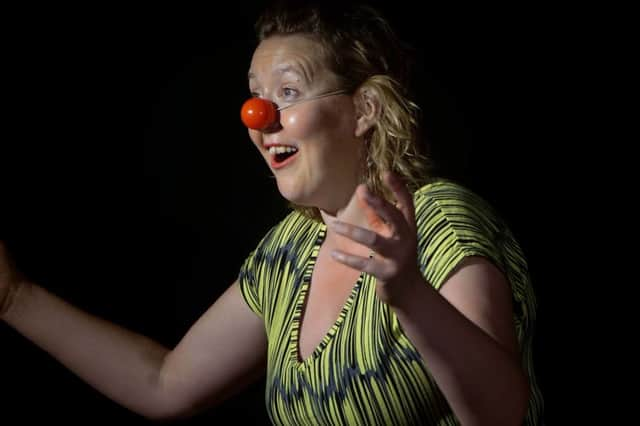Edinburgh Fringe 2018: The shows serious about accentuating the positives


While it’s true the news offers any number of reasons to feel gloomy about the world, none of the achievements of humanity or any of us as individuals would have been possible without a sense of hope and optimism. That sense is needed now more than ever – if only to balance out the pessimism into a form of useful and welcome realism.
As an entity which both follows and sets news agendas, the Fringe’s shows often focus on the darker stories of the day, whether that means war, austerity, politics or who’s in the White House. Yet there are many others to be found which offer some kind of positive outlook.
Advertisement
Hide AdAdvertisement
Hide Ad“Art is how we learn to understand ourselves,” says playwright Caitlin Skinner, whose Propeller – inspired by reading Matthew Bolton’s book on community activism How To Resist – tells of a group of people living in an isolated town on the east coast of Scotland who decide to reopen the local railway. “I once watched a documentary in which Antony Gormley was talking about Ice Age art and he was reflecting on how crucial art was to those people who were living through the harshest, most intense circumstances. Even in our toughest times, the Ice Age humans were dedicating huge amounts of time and energy to making this art, because when times are tough that’s when we need it the most.”


Victoria Firth’s one-woman piece of theatrical storytelling, How To Be Amazingly Happy!, is based on her experience of being unable to have children, but she says the title easily maps on to other crises. “It’s equally resonant for people whose relationships don’t work out, jobs fall through, communities break up, or those who experience tragedies and disasters,” she says. “It shows that when things go wrong it becomes important to prioritise, focus and find new ways of doing things or different places to find meaning. It’s about human endeavour – how we get up again when we fall down.”
Kaisa Lundán’s play, All The Lights Are On, is about the limits of hope in the face of terminal cancer; yet even in darkness, it finds light. “It doesn’t necessarily look on the bright side,” she says, “but I believe the tremendous energy and love that is spurred by the darkest events are things that ripple, and that energy will in turn create something new. You can find comfort in understanding there isn’t a wrong way to face major tragedies; there are no superheroes or saints in this play, just imperfect humans trying to deal with it all.”
Health and disease also inform composer Jim Harbourne’s The Myth Of The Singular Moment, a fictional story inspired by his mother’s Huntingdon’s disease and the possibility that the condition may have been transmitted to him and his siblings. “It’s a play about choice,” he says. “It tries to get to grips with the fact that we have so little control over our lives, and over the world around us. This can get on top of us and is a hard thing to think about, but the hope comes from the universality of that – we’re all in the same boat.”
Optimism around health also manifests itself in themed comedy shows, like writer Paul Mayhew-Archer’s Incurable Optimist, which is about living and working with Parkinson’s. “Comedy and laughter can make us feel better,” he says. “I hope people will find hope in my story; I’m 65, I have an incurable illness and I’m embarking on a whole new career as a performer and loving it. PT Barnum said, ‘The noblest art is that of making others happy.’ That’s what I hope to do.”
Mark Thomas’s Check Up: Our NHS At 70 isn’t nearly as doom-laden as many prognoses for the Health Service might insist. “People caring for others is a mixture of empathy, duty and optimism,” says Thomas. “I try and look realistically at the NHS, so the causes for optimism lie alongside the causes for anger and frustration – the great thing about it is the people who work in it and their commitment and the medical advances are genuinely amazing. Art is about struggle, change and empathy, so at the very least it can be a cheerleader for a better world.”
Advertisement
Hide AdAdvertisement
Hide Ad“I’m optimistic to an almost Panglossian degree,” says Lucy Porter, whose stand-up show, Pass It On, is about what we leave behind for future generations. “In fact, I have been described as ‘irritatingly cheerful’ in both my personal and professional life. I believe that most people want to be remembered fondly after they die, and that fact prevents a lot of wrongdoing and encourages a lot of kindness.”
On the subject of passing things on, Matt Winning’s show, Climate Strange, is about the environment. “I think once people know why they are responding it opens up a huge amount of optimism in terms of finding positive solutions and influencing those we care about,” he says. “At the end of the day it’s about focusing on doing things better and doing better things. I think we have to be optimistic while retaining a sense of where we are and where we may end up; it’s all about balance, you need both.”
Robyn Perkins’ 10,000 Decisions, meanwhile, asks whether we can choose to be happy: “If we all embrace the potential to change, we all move towards becoming better people. I’m an optimist. It sounds cheesy, but if we look at life positively, positive things will result. If you don’t believe in yourself, it will be harder to achieve.” The theatre show Seven Ways To Calm The F**k Down, which is about living with anxiety, reaches similar conclusions. “It explores ways to cope with anxiety, rather than just the negative effects of experiencing it,” says director Ruth Berry. “It attempts to show that it’s possible to live with anxiety without it defining you.”
Finally, Athena Kugblenu’s Follow The Leader asks how much trust we put in leaders and whether we might place it in ourselves instead.
“We’re more responsible for the world than we think we are,” she says. “If we could get less depressed by individuals in charge and feel more collective responsibility to be better, it wouldn’t matter what leaders did, right? We’re becoming better critical thinkers, but we sometimes treat Facebook updates from Shirley at the Leisure Centre as professional journalism, so we still have work to do.”
• All shows until 26 August (not 13, 20) unless otherwise indicated. Propeller, Pleasance Courtyard until 27 August (not 13, 21); How To Be Amazingly Happy!, Pleasance Courtyard until 27 August (not 13, 14); All The Lights Are On, Summerhall; The Myth Of The Singular Moment, Summerhall; Paul Mayhew-Archer: Incurable Optimist, Underbelly (not 13 August); Mark Thomas’ Check Up: Our NHS @ 70, the Traverse; Lucy Porter: Pass It On, Pleasance Courtyard; Matt Winning: Climate Strange, Just The Tonic at the Mash House (not 13 August); Robyn Perkins: 10,000 Decisions, Underbelly (not 13 August); Seven Ways To Calm The F**k Down, Greenside @ Infirmary Street until 25 August (not 19); Athena Kugblenu: Follow The Leader, Underbelly until 26 August (not 13 August)